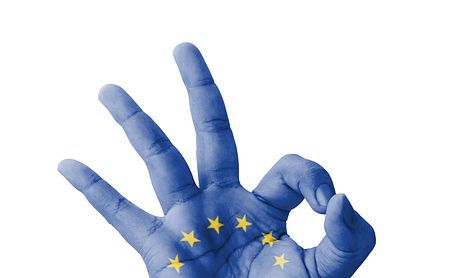Oral Aubagio Approved in EU for Children With RRMS, Ages 10-17
Written by |

The European Commission (EC) has approved Aubagio (teriflunomide) for the treatment of children and adolescents, ages 10 to 17, with relapsing-remitting multiple sclerosis (RRMS).
Aubagio, approved for adults with RRMS since 2013, is now the first oral therapy available as a first-line treatment for pediatric patients in the European Union (EU). The expansion also provides an additional year of marketing protection in the EU, according to Aubagio’s developer, Sanofi.
“The European approval of Aubagio in pediatrics means young people with MS have a new treatment option, and importantly — one that can offer meaningful improvement in managing this serious disease,” Erik Wallström, MD, PhD, therapeutic area head, neurology development at Sanofi Genzyme, said in a press release.
Pediatric multiple sclerosis “remains an area of significant unmet medical need,” Wallström added.
This EC action comes on the heels of the Phase 3 clinical trial TERIKIDS (NCT02201108) which enrolled 166 young patients, with relapsing forms of MS across 22 countries.
After a four-week screening period, all were randomly assigned to either Aubagio (109 patients) or placebo (57 patients) tablets, given once daily for up to 96 weeks (about two years).
The study’s primary goal was to determine the time to a first confirmed relapse. Results showed that patients on Aubagio took a median of 75.3 weeks to experience a first relapse, compared with 39.1 weeks on those on placebo. This represents a 34% decrease in the risk of clinical relapse with Aubagio, but it failed to reach statistical significance — meaning the possibility exists, mathematically, that the difference is due to random chance.
Participants in TERIKIDS who completed the main trial were invited to enter an open-label extension, in which all are being given Aubagio. (The study, which opened in 2014, is due to conclude in September.)
However, in the main trial, those with evidence of high disease activity on MRI scans, even without a confirmed disease relapse, were allowed to move early into TERIKIDS’ open-label part.
According to Sanofi, patients switched more often than expected, with 14% of those on Aubagio and 26% of placebo-group children moving to the open-label extension due to high MRI activity. These moves also occurred earlier in the 96-week main trial than expected.
“This decreased study power for the primary endpoint,” the company stated. In other words, the large number of moves from the main study decreased its mathematical power to identify a significant difference, in a statistical sense.
In additional pre-specified analyses, researchers looked at the time to clinical relapse or switch due to high MRI activity. The median time to either of these endpoints was 72.1 weeks for Aubagio and 37 weeks for placebo — representing a significant, 43% reduction in relative risk.
Treatment with Aubagio also significantly reduced the number of lesions visible on an MRI scan, including both T1 lesions —which represent areas of active inflammation — and T2 lesions, which indicate areas of damage to brain tissue.
Aubagio was generally well-tolerated in the study. Overall rates of adverse events (side effects) were similar among children on Aubagio and placebo (88.1% vs. 82.5%), as were rates of serious adverse events (11.0% vs. 10.5%).
Adverse events more commonly associated with Aubagio included the common cold, hair loss, paresthesia (a burning or prickling sensation, usually felt in the extremities), abdominal pain, and increased levels of creatine phosphokinase, a marker of damage to muscle tissue.
Two (1.8%) patients randomized to Aubagio in the main study experienced pancreatitis (inflammation of the pancreas). During the open-label part, an additional three cases of pancreatitis, including one case of serious acute pancreatitis (when the inflammation is so severe that tissue in the pancreas dies), were reported.
Aubagio works by blocking the growth and activity of inflammatory immune cells that drive the development and progression of MS. It is approved to treat adults with relapsing MS forms of MS in the U.S. and dozens of other countries.
The U.S. Food and Drug Administration, however, rejected Sanofi’s application to extend its use to children, ages 10-17, with relapsing MS in the U.S. this month, saying available data were not sufficient to support such an approval “at this time.”
Oral Gilenya (fingolimod, marketed by Novartis) is the only therapy approved for children ages 10 and older with relapsing forms of MS in the U.S.; it is also approved for pediatric RRMS (10 and older) in Europe.
MS is estimated to affect 2.8 million people worldwide, including at least 30,000 with children and adolescents. Pediatric MS tends to carry higher relapse rates and a greater lesion burden than adult-onset disease, Sanofi notes in its release.


